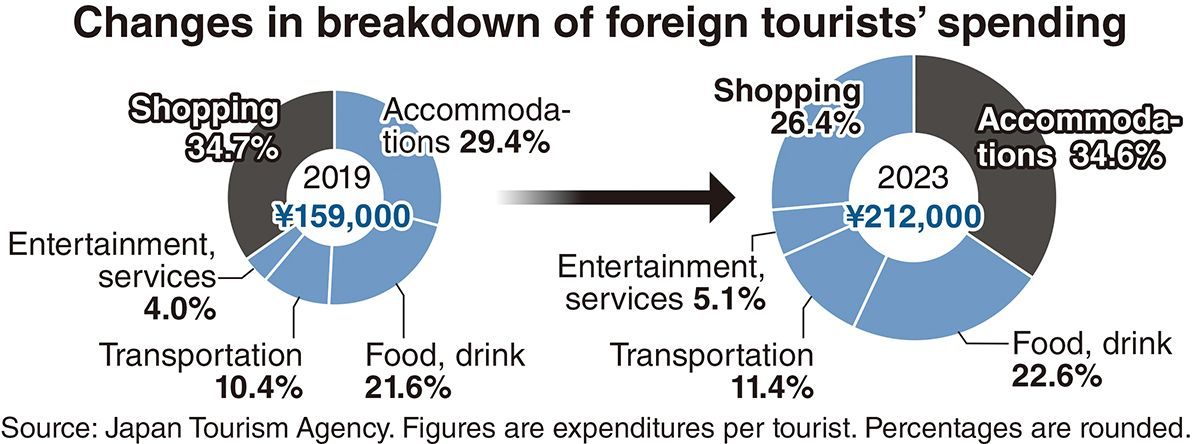Japan’s Hotel Industry Emphasizing Quality over Quantity to Attract Foreign Tourists

Teacups in Kyoto’s Asahiyaki pottery style and other luxurious items are seen in a room at the Palace Hotel Tokyo in Chiyoda Ward, Tokyo.
2:00 JST, January 19, 2024
As lodgings are becoming increasingly important for foreign tourists during their travels, the accommodations industry has been keen to improve the quality of the services it provides, a move spurred by the depreciation of the yen.
The Japan Tourism Agency has announced that the total amount of spending by foreign tourists in 2023 exceeded the ¥5 trillion mark for the first time, reaching the goal set by the government last year. While shopping sprees, mainly by Chinese tourists, have been decreasing, consumption that puts value on personal experiences has become common among foreign visitors.
¥100,000 per night
“We want to enhance our brand strength with this guest room,” said Masaru Watanabe, general manager of the Palace Hotel Tokyo in Tokyo’s Chiyoda Ward on Wednesday, introducing a room that is available for only a limited period of time. Ceramic teacups made in the Asahiyaki pottery style and cushions made of Nishijin-ori fabric, both from Kyoto, are featured in the room. Uji tea bags, also from Kyoto, are provided, too.
In addition to the weak yen, accelerated inflation overseas has made travel to Japan more affordable for tourists from the United States and European nations, making it easier for hotels in Japan to raise room prices.
The average daily room rate at the Palace Hotel Tokyo was about ¥70,000 before the pandemic, but the figure exceeded ¥100,000 last year. About 70% of their guests are foreigners, according to the hotel.
“Compared to hotels in Paris and New York, the rate is still relatively low,” Watanabe said.
As labor shortages continue, even at luxury accommodations, hotels are said to be trying to maintain service standards without raising occupancy rates, accelerating moves to emphasize quality instead of quantity.
The Imperial Hotel will open a new hotel in Kyoto in 2026, and a number of foreign-affiliated luxury hotels, such as the Bulgari Hotel Tokyo, have also entered the market.

Less consumption of goods
According to the tourism agency, travel expenditures per foreign tourist for 2023 reached ¥212,000, as they spent at least 30% more than in 2019 at ¥159,000. Lodging fees accounted for 34.6% of the spending, an increase of more than 5 percentage points from 2019.
“We are seeing signs of growth in spending on firsthand experiences,” Japan Tourism Agency Commissioner Ichiro Takahashi said at a press conference on Wednesday. “We hope people stay longer and enjoy a variety of experiences.”
On the other hand, consumption of goods, once the main consumptive activity of foreign visitors to Japan, has leveled off. They spent ¥1.395 trillion in 2023, down from ¥1.669 trillion in 2019. The decrease was mainly due to the slow recovery in the number of Chinese visitors.
With the spread of online shopping, many of the products available in Japan can now be purchased abroad. Many believe the days of foreign tourists going on shopping sprees like they did in the past are unlikely to return.
■ Challenges in local regions
Attracting visitors to rural areas that are rich in nature and culture remains a challenge.
According to the agency, the number of foreign tourists who stayed overnight exceeded the 2019 level in the three major metropolitan areas as of October, but the figure was 10% lower in rural areas. Long-term efforts, such as training guides who are familiar with local areas and improving the environment for tourism, will likely be necessary to promote consumption on local and unique firsthand experiences.
The government aims to increase the amount of money spent by foreign visitors to ¥15 trillion by 2030. According to an executive at a major travel agency, because wealthy travelers have high expectations for services, it is necessary to provide them with experiences that they can enjoy only during their trips.
However, Yayoi Sakanaka, a senior economist at Mizuho Research & Technologies, Ltd., said: “The increased travel spending is only temporary. It is nothing more than a reaction to the stagnation of economic activity that occurred during the pandemic.”
Related Tags
Top Articles in Business
-

Prudential Life Insurance Plans to Fully Compensate for Damages Caused by Fraudulent Actions Without Waiting for Third-Party Committee Review
-

Narita Airport, Startup in Japan Demonstrate Machine to Compress Clothes for Tourists to Prevent People from Abandoning Suitcases
-

Japan, U.S. Name 3 Inaugural Investment Projects; Reached Agreement After Considerable Difficulty
-

Toyota Motor Group Firm to Sell Clean Energy Greenhouses for Strawberries
-

SoftBank Launches AI Service for Call Centers That Converts Harsh Customer Voices into Softer Voices
JN ACCESS RANKING
-

Producer Behind Pop Group XG Arrested for Cocaine Possession
-

Japan PM Takaichi’s Cabinet Resigns en Masse
-

Man Infected with Measles Reportedly Dined at Restaurant in Tokyo Station
-

Israeli Ambassador to Japan Speaks about Japan’s Role in the Reconstruction of Gaza
-

Videos Plagiarized, Reposted with False Subtitles Claiming ‘Ryukyu Belongs to China’; Anti-China False Information Also Posted in Japan






















